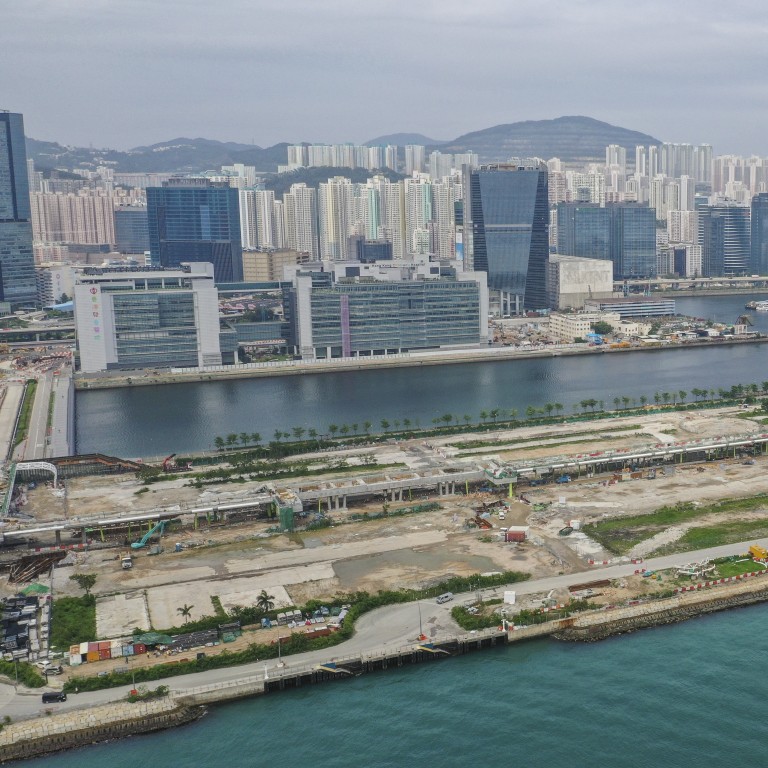
Plot of commercial land at Kai Tak, Hong Kong’s former airport, withdrawn from government tender after failing to attract high enough bids
- The government has rejected all five bids received for the purchase of Area 4C Site 4 at Kai Tak
- The apparent lack of appetite for the site comes as the crippling social unrest engulfing Hong Kong enters a 17th week and shows no sign of abating
A plot of commercial land on the runway of Hong Kong’s former international airport has been withdrawn from sale after it failed to attract a high enough bid, the Lands Department said on Wednesday.
The government has rejected all five bids received for Area 4C Site 4 at Kai Tak because “the tendered premiums did not meet the government’s reserve price for the site,” the authority said.
The waterfront site with a gross floor area of 863,000 square feet is earmarked for development of a hotel, offices and shopping centres.
The Lands Department said in a statement that it would not speculate about why the bids from CK Asset Holdings, Chinese Estates Holdings, Great Eagle Holdings, Sun Hung Kai Properties and Sino Land had fallen short.
But the apparent lack of appetite for the site comes as the crippling social unrest that has engulfed Hong Kong, devastating tourist numbers and tarnishing its global reputation, enters a 17th week and shows no sign of abating.
“Why would developers put in high bids now, when the hospitality and retail sectors are witnessing such a large slump?” said Vincent Cheung, managing director of Vincorn Consulting and Appraisal. “The government is expecting too much and not taking into consideration the current situation.”
He said the failure to find a buyer might have a knock-on effect on the market.
“The withdrawal will create a vicious circle. We may see more scrapped land sales later as more investors turn skeptical towards the market when they see even big developers are getting cold feet,” he said.
Developer walks away from Kai Tak project, citing ‘social contradiction’
Area 4C Site 4 at Kai Tak is proving problematic for the government.
Having secured the site for HK$11.1 billion (US$1.42 billion) on May 15, Goldin Financial Holdings forfeited a HK$25 million deposit and walked away from the deal less than a month later, citing “social contradictions”.
It was not clear what the developer meant by this, but its decision to abandon the transaction came two days after a million people took to the streets to oppose the controversial extradition bill that sparked the worst political crisis in Hong Kong’s history.
The protests have became more disruptive and violent, often leading to the closure of shops, subway stations and roads as riot police battle for control using tear gas and water cannons.
Cheung reckons the plot would have lost about 40 per cent of its value since the demonstrations began, and would now be worth about HK$6.9 billion, or HK$8,000 per square foot.
The latest official figures for shop sales showed a slowdown of 11.4 per cent in July from a year ago, and the situation is expected to have worsened since then. Paul Chan Mo-po, the city’s Financial Secretary, warned in a blog post that tourism will plunge 40 per cent in August from a year ago.
Land sales are the biggest generator of revenues for the Hong Kong government.
“If they can make more by selling the land at a later date, for the sake of our treasuries they should find the right time for the land tender,” said Kenneth Leung, a lawmaker for the accounting sector.
At least 30 per cent, but no more than half, of Area 4C Site 4’s gross floor area must be reserved for a hotel with between 480 and 800 rooms. The remaining area will be zoned for commercial purposes, such as offices and retail space.
Sun Hung Kai Properties said occupancy rates at the company’s hotels have plunged on average by 30 to 40 per cent, with some hotels finding themselves just half full, with visitors deterred by the protests.

